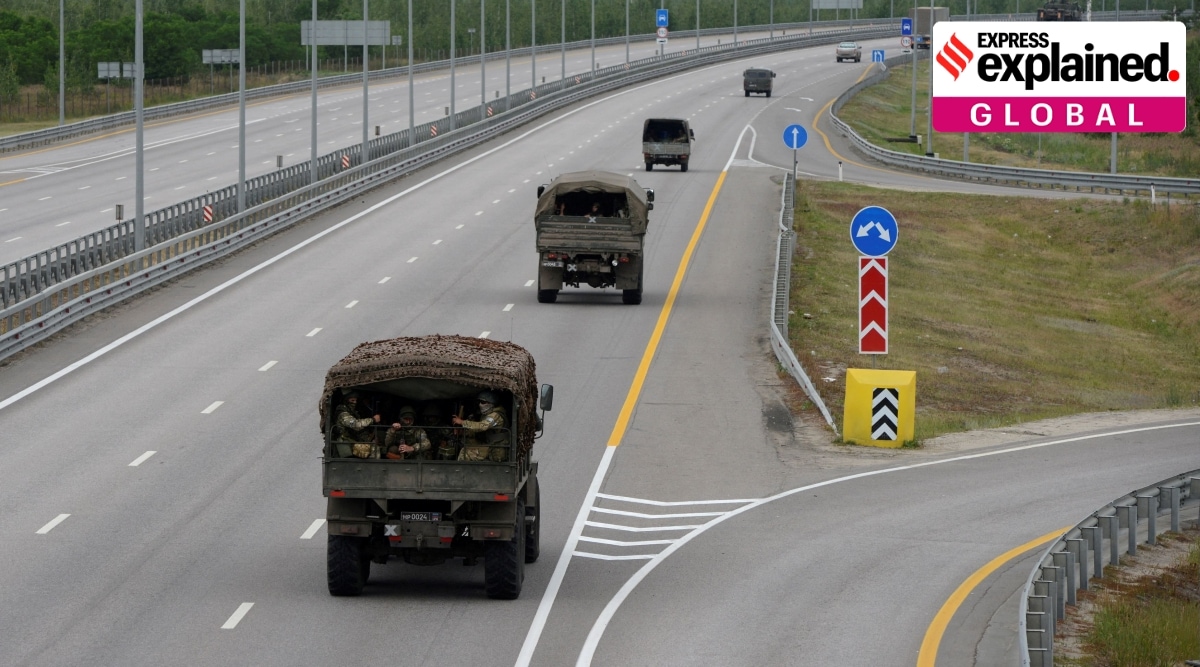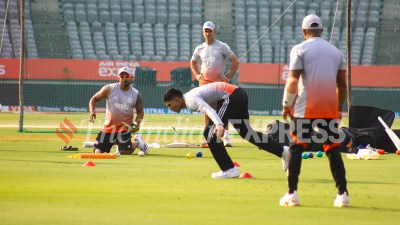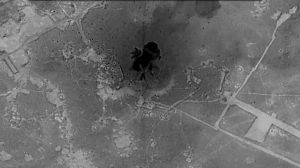Prigozhin orders Wagner mercenaries to halt Moscow march after speaking to Lukashenko: What is happening in Russia?
So-called 'coup' over in Russia, for now: Discussions between Wagner chief Yevgeny Prigozhin and Belarusian President Alexander Lukashenko, who was acting at the behest of Russian President Vladimir Putin, were reportedly fruitful. Here's a quick recap.
 A military column of Wagner private mercenary group drives along M-4 highway, which links the capital Moscow with Russia's southern cities, near Voronezh, Russia, June 24, 2023. (REUTERS/Stringer)
A military column of Wagner private mercenary group drives along M-4 highway, which links the capital Moscow with Russia's southern cities, near Voronezh, Russia, June 24, 2023. (REUTERS/Stringer) Yevgeny Prigozhin, the head of the Wagner Group said on Saturday (June 24) that he has ordered his mercenaries to halt their march to Moscow and retreat to their field camps in Ukraine to avoid shedding Russian blood, AP reported.
The announcement came as Moscow was bracing for the arrival of Wagner troops, with Prigozhin’s men less than 200 km away. The Kremlin has said that the Wagner group chief will move to Belarus and not face prosecution. According to a spokesperson of the Kremlin, President Vladimir Putin had allowed Prigozhin and his forces to go free as his “highest goal” was “to avoid bloodshed and internal confrontation with unpredictable results.”
Previously, the office of Belarusian President Alexander Lukashenko announced that he had negotiated a deal with Prigozhin to halt Wagner’s advance and take further steps to de-escalate the tensions.
The statement mentioned that the proposed settlement contains security guarantees for Wagner troops but did not elaborate on whether Prigozhin’s demands for the ouster of Defence Minister Sergei Shoigu will be met.
The most serious challenge to Putin yet
Earlier on Saturday, Putin vowed harsh consequences for organisers of the “armed rebellion” led by his former ally Yevgeny Prigozhin. In a televised speech to the nation, Putin called the rebellion a “betrayal” and “treason.”
“All those who prepared the rebellion will suffer inevitable punishment,” Putin said. “The armed forces and other government agencies have received the necessary orders.”
Prigozhin, founder and chief of the Wagner Group, currently involved in the fight in Ukraine, brought his forces back into Russia, seized a key military facility in Rostov-on-Don and advanced towards Moscow on what he called a “march for justice”.
He claimed to have over 25,000 soldiers at his disposal with many more loyal to him. “We didn’t kill a single person on our way,” Prigozhin said.
A friendship turned sour
Prigozhin, in fact, used to be one of the closest allies of Vladimir Putin. A convict-turned-businessman, his rise comes on the back of his catering business, which served Russia’s rich and powerful.
Known as “Putin’s chef”, Prigozhin founded Wagner in 2014, in order to assist Putin’s invasion of Crimea. Since then he has been involved in Russian ‘interventions’ across the world, especially in Africa and Syria.
Wagner has been pivotal in Russia’s ongoing conflict with Ukraine, fighting side by side with Russian regulars. However, of late, there have been growing tensions between Prigozhin and the Russian military brass.
While Wagner’s mercenaries had played a crucial role in capturing the east Ukrainian city of Bakhmut, Prigozhin had grown increasingly critical of the military brass, accusing it of incompetence and of starving his troops of munitions.
Prigozhin’s attempted ‘coup’ came on the back of his claim that Russian forces had attacked his troops, causing a number of casualties. He said that he wanted to punish Defense Minister Sergei Shoigu for attacking Wagner field camps in Ukraine with rockets, helicopter gunships and artillery.
Lukashenko the mediator
The sudden calling off of Wagner troops comes after talks between Belarussian President Alexander Lukashenko and Prigozhin.
Lukashenko has been a long-time ally of Putin, with the Russian President helping him maintain an iron grip over his country. He is currently the longest-serving European president, in office since 1994.
Saturday morning, his office released a statement saying that Belarus remained an ally of Russia and that “any provocation, any internal conflict in the military and political circles, in the information field and civil society is a gift to the collective West.”
His latest statement states that Lukashenko spoke to Putin about the situation with Wagner in the morning and consequently, with Putin’s approval, “held negotiations with the Wagner boss Yevgeny Prigozhin” – negotiations which lasted all day.
“As a result, the sides agreed that it is unacceptable to start a bloodbath in Russia’s territory,” the statement reported by BelTA, Belarus’s official news agency, read.
The statement added that the negotiated deal involves security guarantees for Wagner fighters – despite Putin’s previous proclamation which claimed that “everyone” who participated in the rebellion will be “punished”.
Coup averted, crisis remains
While for the time being, the coup might have been avoided, Saturday’s crisis underlines certain major weaknesses in Russia’s military and political establishment as well as its strategy for the war against Ukraine.
The war, which has been going on for a year and a half, has taken an unforeseen toll on Russian forces. While Putin had promised a swift victory, the war dragged on, causing massive casualties and disenchantment within the forces, especially with the top brass.
Prigozhin’s demand for the ouster of Defence Minister Shoigu and Chief of General Staff General Valery Gerasimov echoes this disenchantment.
However, the Washington DC-based Institute for the Study of War, a reputed think tank, has noted: “the violent overthrow of Putin loyalists like Shoigu and Gerasimov would cause irreparable damage to the stability of Putin’s perceived hold on power.”
What has the Kremlin said?
Kremlin spokesman Dmitry Peskov announced that charges against Prigozhin for mounting an armed rebellion will be dropped and his men will not face prosecution. Those in the Wagner Group who did not take part in the uprising will be offered contracts by the Defence Ministry, the news agency AP reported.
Despite Putin’s vow to punish those behind the rebellion, the spokesperson said that the President’s “highest goal” was “to avoid bloodshed and internal confrontation with unpredictable results.”
- 01
- 02
- 03
- 04
- 05






































